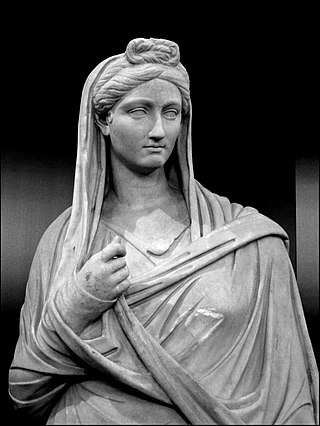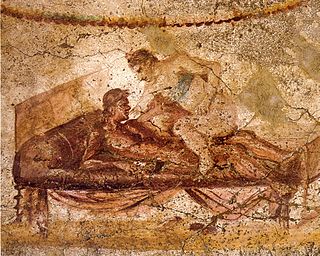Related Research Articles

Marcus Antonius, commonly known in English as Mark Antony, was a Roman politician and general who played a critical role in the transformation of the Roman Republic from a constitutional republic into the autocratic Roman Empire.
Courtesan, in modern usage, is a euphemism for a kept mistress or prostitute, particularly one with wealthy, powerful, or influential clients. The term historically referred to a courtier, a person who attended the court of a monarch or other powerful person.
Gaius Verres was a Roman magistrate, notorious for his misgovernment of Sicily. His extortion of local farmers and plundering of temples led to his prosecution by Cicero, whose accusations were so devastating that his defence advocate could only recommend that Verres should leave the country. Cicero's prosecution speeches were later published as the Verrine Orations.
Servilia was a Roman matron from a distinguished family, the Servilii Caepiones. She was the daughter of Quintus Servilius Caepio and Livia, thus the half-sister of Cato the Younger. She married Marcus Junius Brutus, with whom she had a son, the Brutus who, along with others in the Senate, would assassinate Julius Caesar. After her first husband's death in 77, she married Decimus Junius Silanus, and with him had a son and three daughters.

Freeborn women in ancient Rome were citizens (cives), but could not vote or hold political office. Because of their limited public role, women are named less frequently than men by Roman historians. But while Roman women held no direct political power, those from wealthy or powerful families could and did exert influence through private negotiations. Exceptional women who left an undeniable mark on history include Lucretia and Claudia Quinta, whose stories took on mythic significance; fierce Republican-era women such as Cornelia, mother of the Gracchi, and Fulvia, who commanded an army and issued coins bearing her image; women of the Julio-Claudian dynasty, most prominently Livia and Agrippina the Younger, who contributed to the formation of Imperial mores; and the empress Helena, a driving force in promoting Christianity.

Cornelia was the second daughter of Publius Cornelius Scipio Africanus, a Roman general prominent in the Second Punic War, and Aemilia Paulla. Although drawing similarities to prototypical examples of virtuous Roman women, such as Lucretia, Cornelia puts herself apart from the rest because of her interest in literature, writing, and her investment in the political careers of her sons. She was the mother of the Gracchi brothers, and the mother-in-law of Scipio Aemilianus.

Fulvia was an aristocratic Roman woman who lived during the Late Roman Republic. Fulvia's birth into an important political dynasty facilitated her relationships and, later on, marriages to Publius Clodius Pulcher, Gaius Scribonius Curio, and Mark Antony. All of these men would go on to lead increasingly promising political careers as populares, tribunes, and supporters of Julius Caesar.

The hooker with a heart of gold is a stock character involving a courtesan or prostitute who possesses virtues such as integrity, generosity and kindness.

Atia was the niece of Julius Caesar, and mother of Gaius Octavius, who became the Emperor Augustus. Through her daughter Octavia, she was also the great-grandmother of Germanicus and his brother, emperor Claudius.

Aurelia was the mother of the Roman general and statesman Julius Caesar.
"In Verrem" is a series of speeches made by Cicero in 70 BC, during the corruption and extortion trial of Gaius Verres, the former governor of Sicily. The speeches, which were concurrent with Cicero's election to the aedileship, paved the way for Cicero's public career.
Servilia was the wife of Quintus Lutatius Catulus, the consul during 102 BC. She was of the patrician Caepione branch of the Servilia gens.
Lucius Caecilius Metellus was a Roman aristocrat. He was praetor in 71 BC. He succeeded Gaius Verres as governor of Sicily in 70 BC. He died in office as consul in 68 BC. His co-consul was Quintus Marcius Rex.
Quintus Caecilius Metellus Creticus was a politically active member of the Roman upper class. He was praetor in 74 BC and pontifex from 73 BC until his death. He was consul in 69 BC along with Quintus Hortensius Hortalus.

Prostitution in ancient Rome was legal and licensed. Men of any social status were free to engage prostitutes of either sex without incurring moral disapproval, as long as they demonstrated self-control and moderation in the frequency and enjoyment of sex. Brothels were part of the culture of ancient Rome, as popular places of entertainment for Roman men.

The gens Caecilia was a plebeian family at ancient Rome. Members of this gens are mentioned in history as early as the fifth century BC, but the first of the Caecilii who obtained the consulship was Lucius Caecilius Metellus Denter, in 284 BC. The Caecilii Metelli were one of the most powerful families of the late Republic, from the decades before the First Punic War down to the time of Augustus.

Volumnia Cytheris was an ancient Roman actress and mimae dancer. She is foremost known as the mistress of several famous Romans.
Tertia was an ancient Roman actress and dancer.
Galeria Lysistrate or Lysistrata (2nd-century) was the concubine of the Roman Emperor Antoninus Pius.
Praecia was a Roman courtesan, famed for her influence within Roman politics.
References
- ↑ Anise K. Strong: Prostitutes and Matrons in the Roman World
- ↑ Anise K. Strong: Prostitutes and Matrons in the Roman World
- ↑ Anise K. Strong: Prostitutes and Matrons in the Roman World